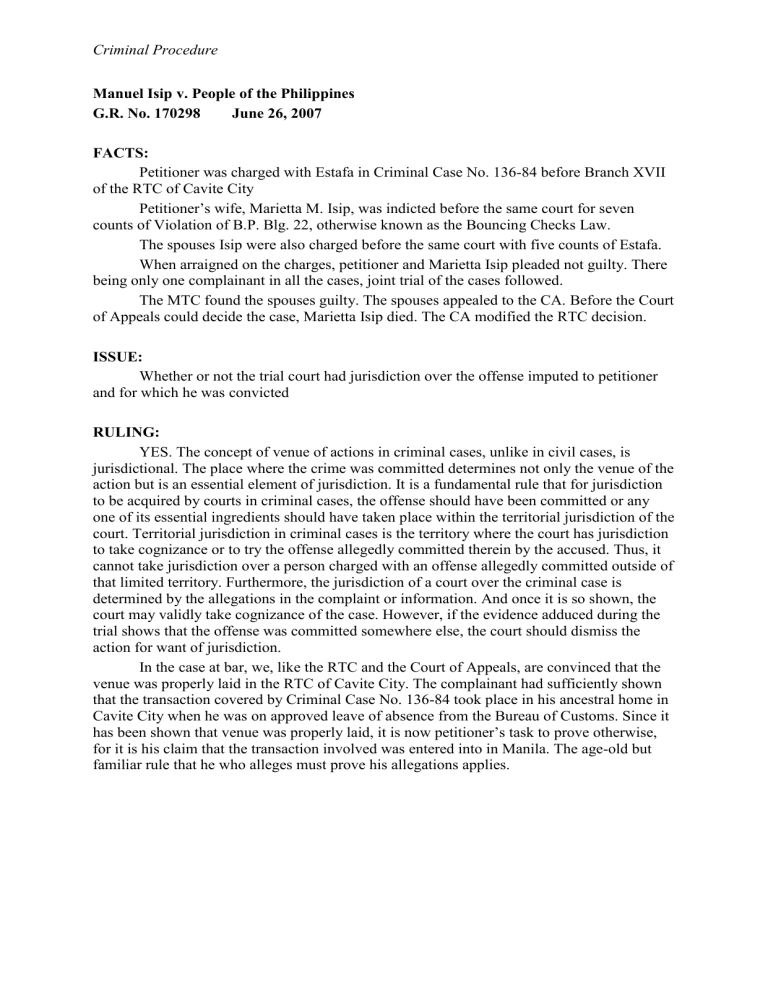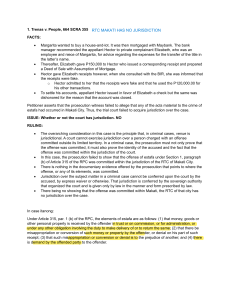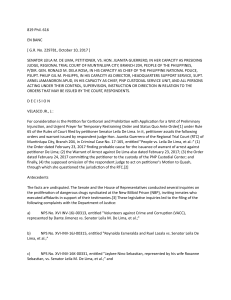
Criminal Procedure Manuel Isip v. People of the Philippines G.R. No. 170298 June 26, 2007 FACTS: Petitioner was charged with Estafa in Criminal Case No. 136-84 before Branch XVII of the RTC of Cavite City Petitioner’s wife, Marietta M. Isip, was indicted before the same court for seven counts of Violation of B.P. Blg. 22, otherwise known as the Bouncing Checks Law. The spouses Isip were also charged before the same court with five counts of Estafa. When arraigned on the charges, petitioner and Marietta Isip pleaded not guilty. There being only one complainant in all the cases, joint trial of the cases followed. The MTC found the spouses guilty. The spouses appealed to the CA. Before the Court of Appeals could decide the case, Marietta Isip died. The CA modified the RTC decision. ISSUE: Whether or not the trial court had jurisdiction over the offense imputed to petitioner and for which he was convicted RULING: YES. The concept of venue of actions in criminal cases, unlike in civil cases, is jurisdictional. The place where the crime was committed determines not only the venue of the action but is an essential element of jurisdiction. It is a fundamental rule that for jurisdiction to be acquired by courts in criminal cases, the offense should have been committed or any one of its essential ingredients should have taken place within the territorial jurisdiction of the court. Territorial jurisdiction in criminal cases is the territory where the court has jurisdiction to take cognizance or to try the offense allegedly committed therein by the accused. Thus, it cannot take jurisdiction over a person charged with an offense allegedly committed outside of that limited territory. Furthermore, the jurisdiction of a court over the criminal case is determined by the allegations in the complaint or information. And once it is so shown, the court may validly take cognizance of the case. However, if the evidence adduced during the trial shows that the offense was committed somewhere else, the court should dismiss the action for want of jurisdiction. In the case at bar, we, like the RTC and the Court of Appeals, are convinced that the venue was properly laid in the RTC of Cavite City. The complainant had sufficiently shown that the transaction covered by Criminal Case No. 136-84 took place in his ancestral home in Cavite City when he was on approved leave of absence from the Bureau of Customs. Since it has been shown that venue was properly laid, it is now petitioner’s task to prove otherwise, for it is his claim that the transaction involved was entered into in Manila. The age-old but familiar rule that he who alleges must prove his allegations applies.







